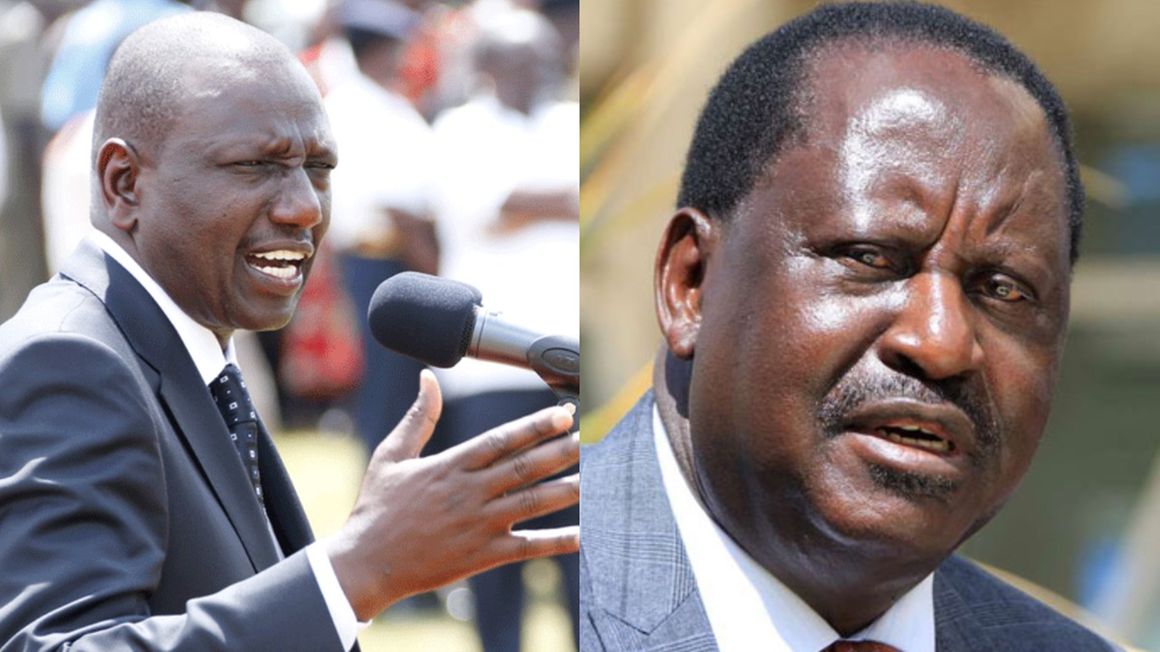
Deputy President William Ruto and ODM leader Raila Odinga.
In travels outside Kenya over the last year, the question very many asked was who, between Deputy William Ruto and opposition leader and former PM Raila Odinga, was likely to win the August election.
There were also anxious questions about the likelihood of violence. In recent weeks, however, I have noticed a change in tone. First, there is slightly less anxiety about violence. It’s not clear why this shift has happened.
One likely explanation seems to be that President Uhuru Kenyatta has decisively cast his lot behind Raila. While, as someone put it, “it removes some uncertainty because the incumbent or his side always does better in African elections”, my reading was that most external observers of Kenya saw the move as a stabilising factor for two reasons.
First, Mr Kenyatta would not want his legacy to be sullied by violence, so he will put pressure on the Azimio la Moja side not to take to the barricades should it lose in conditions they think are unfair. Secondly, that though he and Mr Ruto have gone their separate ways, precisely because he is on the other side, the Deputy President is more likely to prevail on his troops not to go to war should their side lose in what they see as a rigged vote. I would never have looked at the picture that way. We won’t have long to wait to see if they are correct.
One also gets the sense that unlike in 2007/2008, this time most of Kenya’s neighbours are better prepared for a breakdown and violence. For example, at that time Uganda didn’t have a national airline and was locked into an unhappy, complaining reliance on Kenya Airways. Today it has Uganda Airlines. RwandAir was in its infancy. Today it has a well-developed fleet and hub.
Tanzania’s Dar es Salaam has expanded and modernised significantly in the 14 years. The East African hinterland countries will still face some disruption if there’s election-related unrest and blockage of the northern corridor, but it will not be as severe as in 2007. Dar es Salaam offers them a solid Plan B.
Additionally, they see the field as narrowing, as other notable claimants to the throne – like Kalonzo Musyoka, Martha Karua, and Musalia Mudavadi – hitch their horses to the Raila and Ruto wagons, further reducing uncertainty. “With every other week, we see fewer wild cards out there in this Kenyan election,” one of them offered.
This reference to there being no wildcards out there references the fact that all the principals in these alliances, many of who will go on to have key government roles if their side wins, are men and women with a record. There are no surprises. If one compares it to Tanzania at the end of 2014 seven months ahead of the ruling CCM presidential candidate nomination in July 2015, there isn’t a John Magufuli, who eventually became president. And most definitely there is no Samia Suluhu Hassan who became his vice president, and president in March 2021 when he died. Though both Magufuli and President Hassan had been in government, they were not in most people’s early sights as successors.
Perhaps because, below the smoke and all the noise, there is little room for surprise left in the August vote, there are quite a few fellows who are looking beyond the election, and are curious whether the electoral coalitions that have been struck will last.
My answer has been that there is a first time for everything, so it is possible Azimio and Kenya Kwanza, the presumed front-running coalitions, could make history and last to the end. However, going by precedent; the collapse in three years of the National Rainbow Coalition (Narc) that brought Mwai Kibaki to power at the end of 2002; the splinter in the Raila-led opposition Orange Democratic Movement (ODM) within two years of it entering the national unity after the 2007/2008 post-election violence; the blow-up of the ruling Jubilee party in the second term of the Uhuru-Ruto duo; and the scuppering of Raila’s National Super Alliance (Nasa) after the disputed 2017 polls and its history-making victory in winning the petition to overturn the election result, there is little but hope to expect better.
This raises the question; is it really necessary for electoral coalitions to stay together? Could it be a good thing that they break up quickly?
Kenyan politics is very transactional, a marketplace that is likely to be not just Africa’s, but one of the world’s largest political trading exchanges. It’s not often that folks will fall in love with the woman from whom they buy vegetables in the market and marry them, or the butcher at their local meat shop. It is sound practice for buyers and sellers to go their separate ways when the market closes.
The most valuable real-world benefit of Kenya’s shotgun political alliances and their quick divorces could be that the country avoids getting locked in bad policy for too long, as politicians quickly remarry and take on partners with different interests and priorities.


No comments:
Post a Comment